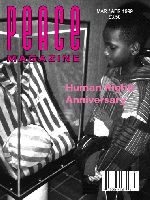
Peace Magazine Mar-Apr 1999, page 24. Some rights reserved.
Search for other articles by Valerie Zawilski here
The Women in Conflict Zones Network (WICZNET or 'The Network') was established in 1996, at Canada's York University by Professor Wenona Giles, its principal co-ordinator, and Dr. Maja Korac, the project's consultant. Began as a study group composed mainly of academics from around the world involved in research related to issues of gender, nationalism, militarization, armed conflict, peace activism, displacement, and violence against women, it is affiliated with the Centre for Feminist Research at York University. The WICZNET project is supported by the Social Sciences and Humanities Research Council of Canada, which has provided funding for three meetings and a listserve. Papers from its two meetings in November 1996 and May 1997 addressed the following issues: the construction of gender and ethnic/national identities which precipitate and/or perpetuate war; the gendered violence of war; citizenship and war; the gendered processes of militarization in a conflict situation; feminist responses to the politics of peace-making and justice in conflict zones; the gendered political economy of war; rape as a weapon of genocide and war; militarization and gender; displacement and gendered mobility; the links between gender and nationalism as the bases for both militant and politically progressive actions. The papers from these meetings will be published in an edited collection in Routledge Press' Women and Peace Series.
The WICZNET received financial support from the Ford Foundation in New York and the Open Society Institute in Budapest for a pilot project to comparatively examine the cases of Sri Lanka and the former Yugoslavia. Academics and women activists from Sri Lanka, the former Yugoslavia, and the WICZNET gathered in Henedela (Colombo), Sri Lanka, in December 1998 to participate in a feminist dialogue that focused on the problems faced by women living in conflict zones in Sri Lanka.
The discussion during the Sri Lankan workshop addressed the following concerns: patterns of resistance among women living in conflict zones and refugee camps in Sri Lanka, gendered violence against women, and peace activism by Sri Lankan women. The second meeting of the WICZNET Sri Lanka-former Yugoslavia project will focus on women living in the former Yugoslavia. This workshop wil be held in Sarajevo in July 1999.
Valerie Zawilski teaches Peace Studies at Wilfred Laurier University.

Peace Magazine Mar-Apr 1999, page 24. Some rights reserved.
Search for other articles by Valerie Zawilski here